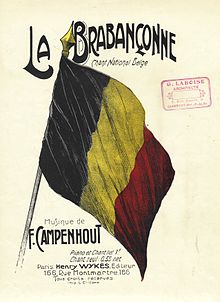La Brabançonne
| English: The Brabantian | |
|---|---|

Cover of a score of the Brabançonne, dated around 1910
|
|
|
National anthem of |
|
| Lyrics |
Alexandre Dechet and Constantin Rodenbach (original version, 1830) Charles Rogier (current version, 1860) |
| Music | François Van Campenhout, September 1830 |
| Adopted | 1860, current text in 1921 |
| Music sample | |
|
|
|
The "Brabançonne" (French: [bʁabɑ̃sɔn]) is the national anthem of Belgium. The originally-French title refers to Brabant; the name is maintained untranslated in Belgium's other two official languages, Dutch and German.
According to legend, the Belgian national anthem was written in September 1830, during the Belgian Revolution, by a young revolutionary called "Jenneval", who read the lyrics during a meeting at the Aigle d'Or café.
Jenneval, a Frenchman whose real name was Alexandre Dechet (sometimes known as Louis-Alexandre Dechet), did in fact write the Brabançonne. At the time, he was an actor at the theatre where, in August 1830, the revolution started which led to independence from the Netherlands. Jenneval died in the war of independence. François Van Campenhout composed the accompanying score, based on the tune of a French song called "L'Air des lanciers polonais" ("the tune of the Polish Lancers"), written by the French poet Eugène de Pradel, whose tune was itself an adaptation of the tune of a song, "L'Air du magistrat irréprochable", found in a popular collection of drinking songs called "La Clé du caveau" ("The Key to the cellar") and it was first performed in September 1830.
In 1860, Belgium formally adopted the song and music as its national anthem, although the then prime minister, Charles Rogier edited out lyrics attacking the Dutch Prince of Orange.
The ending, pledging loyalty to "Le Roi, la Loi, la Liberté!" ("The King, and Law, and Liberty!") is an obvious parallel to the French "Liberté, Égalité, Fraternité" – with the republican sentiment of the original replaced in the Belgian version by the promotion of constitutional monarchy (the combination of "The King" and "(the) Law" is what produces "Liberty"). Actually, a slogan similar to the Belgian one – "la Nation, la Loi, le Roi" ("The Nation, The Law, The King") – had been used in the early days of the French Revolution, when that revolution was still considered to be aimed toward constitutional monarchy rather than a republic.
...
Wikipedia
